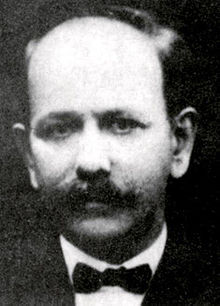lingvo.wikisort.org - Researcher
Allameh Ali Akbar Dehkhodā (Persian: علیاکبر دهخدا; 1879–March 9, 1956) was a prominent Iranian linguist and lexicographer. He was the author of the Dehkhoda Dictionary, the most extensive dictionary of the Persian language published to date.
Ali-Akbar Dehkhoda | |
|---|---|
| Persian: علیاکبر دهخدا | |
 Ali-Akbar Dehkhoda | |
| Born | Ali Akbar Ghazvini 1879 Tehran, Iran |
| Died | March 9, 1956 (aged 77) Tehran, Iran |
| Resting place | Ibn Babawayh Cemetery, Ray |
| Nationality | Iranian |
| Occupation | Lexicographer, Linguist, Satirist |
| Notable work | Amsal o Hekam (Proverbs and Sayings), Dehkhoda Dictionary, Charand o' Parand (pronounced: Ùarand o parand)(fiddle-faddle), French-Persian Dictionary, |
| Political party | Moderate Socialists Party |
Biography
Dehkhoda was born in Tehran to parents from Qazvin. His father, Khan Baba Khan Ghazvini, died when he was only 9 years old.[1] Dehkhoda excelled quickly in Persian literature, Arabic and French. He enrolled at the School of Political Science, which employed, amongst other figures, the Minister of Foreign Affairs and his Secretary as lecturers.
He was also active in politics, and served in the Majles as a Member of Parliament from Kerman and Tehran. He also served as Dean of Tehran School of Political Science and later the School of Law of the University of Tehran.[2]
In 1903, he went to the Balkans as an Iranian embassy employee, but came back to Iran two years later and became involved in the Constitutional Revolution of Iran.
In Iran Dehkhoda, Mirza Jahangir Khan and Ghasem Khan had been publishing the Sur-e Esrafil newspaper for about two years, but the authoritarian king Mohammad Ali Shah disbanded the parliament and banished Dehkhoda and some other liberalists into exile in Europe. There he continued publishing articles and editorials, but when Mohammad Ali Shah was deposed in 1911, he returned to the country and became a member of the new Majles.
He is buried in Ebn-e Babooyeh cemetery in Shahr-e Ray, near Tehran.[3][4]
In his article "First Iranian Scholar who authored the Most Extensive & Comprehensive Farsi Dictionary," Manouchehr Saadat Noury wrote that,
The literary and commentary works of Ali Akbar Dehkhoda (AAD) actually started through his collaboration with Journal of Soor Esrafeel where he created a satirical political column entitled as Nonsense or Fiddle-Faddle (in Persian: Charand Parand). The Persian term of Dakho was his signature or his pen name for that column. Dakho means not only as the Administrator of a Village (in Persian: Dehkhoda or Kadkhoda), but it also refers to a Naive or an Unsophisticated Person (in Persian: Saadeh Lowh).
Works

Dehkhoda translated Montesquieu's De l'esprit des lois (The Spirit of the Laws) into Persian. He has also written Amsal o Hekam ("Proverbs and Sayings") in four volumes, a French-Persian Dictionary, and other books, but his lexicographic masterpiece is Loghat-nameh-ye Dehkhoda ("Dehkhoda Dictionary"), the largest Persian dictionary ever published, in 15 volumes. Dr. Mohammad Moin accomplished Dehkhoda's unfinished volumes according to Dehkhoda's request after him. Finally the book was published after forty five years of efforts of Dehkhoda.
See also
- Dehkhoda Institute
- Iranian Studies
- List of Persian poets and authors
- Persian literature
Notes
- "Ali akbar dehkhoda". Real Iran. Archived from the original on 21 October 2017. Retrieved 2 August 2018.
- "University of Tehran" (in Persian). Ut.ac.ir. Archived from the original on 2011-02-03. Retrieved 2010-09-07.
- "Photograph of Dehkhoda's grave". inlinethumb05.webshots.com. Archived from the original (PDF) on 2012-02-18. Retrieved 2008-03-26.
- "Photograph". Archived from the original on 2011-05-19. Retrieved 2008-03-26.
External links
- ALÈ-AKBAR QAZVÈNÈ Dehkhodā' @ Encyclopaedia Iranica
- Encyclopaedia of Islam, THREE, "Dihkhudā, ʿAlī-Akbar", John R. Perry
На других языках
[de] Ali Akbar Dehchoda
Ali Akbar Dehchoda (persisch علیاکبر دهخدا Ali-Akbar Dehchodā, DMG ʿAlī Akbar Dehḫodā, * 1879 in Teheran; † 9. März 1956 in Teheran) war ein iranischer Linguist und Autor des „Wörterbuchs von Dehchoda“ (Loghat-nāme-ye Dehchodā) - das umfangreichste Wörterbuch der persischen Sprache.- [en] Ali-Akbar Dehkhoda
[ru] Деххода, Али Акбар
Али Акбар Деххода (перс. علیاکبر دهخدا — Ali Akbar Dehkhodâ, 1879 — 9 марта 1959, Тегеран) — иранский лингвист, лексикограф, писатель и общественный деятель, профессор Тегеранского университета (с 1933), член Иранской Академии персидского языка (с начала 1940-х гг.). Автор крупнейшего словаря персидского языка, насчитывающего около миллиона слов (всего 15 томов).Другой контент может иметь иную лицензию. Перед использованием материалов сайта WikiSort.org внимательно изучите правила лицензирования конкретных элементов наполнения сайта.
WikiSort.org - проект по пересортировке и дополнению контента Википедии